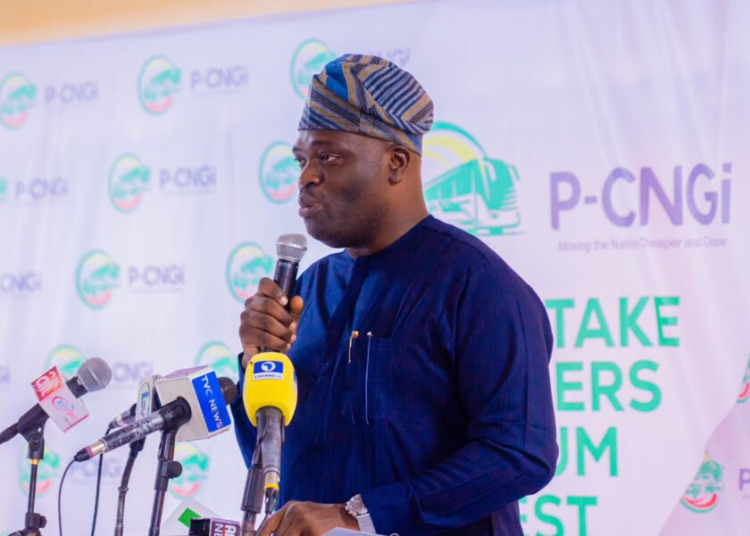Nigeria’s Compressed Natural Gas sector has attracted more than $980m in private investments in just 18 months, with vehicle conversions surging from 4,000 to nearly 100,000, according to the Chief Executive Officer of the Presidential Compressed Natural Gas Initiative, Michael Oluwagbemi.
Speaking on Wednesday at the launch of the Portland Gas Ltd/NASENI CNG Daughter Station, Auto Conversion and Training Centre along the Kubwa Expressway in Abuja, Oluwagbemi described the CNG programme as the country’s “fastest-growing energy sector”, fueled by government incentives and private sector participation.
“I am pleased to report that just 18 months later, we have tracked over $980m worth of investments in the CNG sector. This is easily the fastest-growing sector in the country today, and it continues to grow in leaps and bounds,” he said.
The CNG initiative, championed by President Bola Tinubu as part of measures to cushion the impact of fuel subsidy removal, is aimed at making transportation more affordable and eco-friendly. Oluwagbemi said the transition to CNG offered motorists up to 90 per cent savings on fuel costs.
“Many of us move around in big jeeps, but that’s just about 10 to 20 per cent of the population. The majority, low-income earners, women, schoolchildren, and the aged, rely on public transportation, and transportation costs money. CNG is cheaper, cleaner, and part of a global shift away from internal combustion engines,” he explained.
According to him, strategic partnerships and incentives have driven the rapid expansion of CNG capacity across the country.
From just five states with CNG dispensing and conversion facilities a year ago, the number has now risen to 20, with more than 315 conversion centres nationwide. He projected that before the end of 2025, at least 30 states and the Federal Capital Territory would have CNG infrastructure.
He cited major private sector investments, including a N720bn outlay by BUA and Nigerian Bottling Company on CNG trucks and 100 fuelling stations. Oluwagbemi also urged the protection of CNG allocated for automobiles from being diverted to gas-fired power plants.
According to him, because of the incentive for transition to CNG use, using CNG allows about a 90 per cent discount. He, however, sought the protection of the CNG allocated for automobile use from being diverted to fuel power plants.
The Portland Gas Ltd Chief Executive Officer, Folajimi Mohammed, described the launched station as a gas hub because it has a combination of everything about gas.
He said, “This is what we call the Portland Gas/NASENI gas hub. We call it a hub because, one, we have an auto-conversion centre. We have a training centre. We have a refill station as well here. So we have a combination of everything gas.”
He disclosed that the company has secured approval for the same station to sell liquefied petroleum gas. He added, “So we have a four-tonne approval which you can see right behind us for cooking gas too. So, it is a full hub for gas.”
According to him, the cost of conversion has been subsidised by the PCNGI to the extent that it is free of charge for members of the Nigerian Association of Road Transport Owners and National Union of Road Transport Workers, and Bolt drivers.
Mohammed said in order to extend the CNG to the northern parts of the country, the Nigerian National Petroleum Company Limited is accelerating the work on the Ajaokuta-Kaduna-Kano gas pipeline to also spread it across the nation.
Similarly, the Director-General of the Nigerian Agency for Gas Engineering Infrastructure, Khalil Halilu, said the station was strategically located on the Kubwa expressway since it is central to the North and southern parts of the country.
He said, “We are launching a station on the highway of Kubwa, which you know connects Abuja to the whole of the north, and even the southern part of the country. It is a strategic move to show that the government is ready to position CNG stations in partnership with the private sector, like Portland Gas, in strategic areas to ease transportation for Nigeria.”
He said in partnership with the PCNGI, NASENI has planned for the queues around CNG stations to disappear in the next two years. According to him, the queues indicate that Nigerians have really keyed into the CNG initiative.
Meanwhile, the House of Representatives, however, said it would enact legislation to stop the diversion of auto CNG to other uses such as power plants.
Asked whether the lawmakers would do anything to stop the diversion, the Speaker, Tajudeen Abass, who was represented by Alexander Mascut, said, ‘The lawmakers will make laws to protect the CNG for autogas.
“This transition from something we know to the new one is difficult. However, representatives of the House of Parliament will find a way to come up with legislation that will help to protect gas users.”
FOLLOW US ON:
FACEBOOK
TWITTER
PINTEREST
TIKTOK
YOUTUBE
LINKEDIN
TUMBLR
INSTAGRAM


























